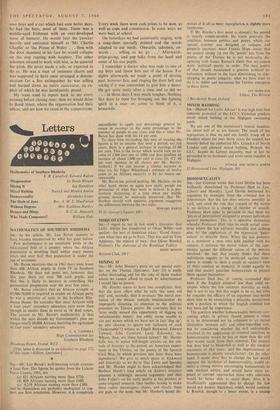MIXING IT
SIR,—Mr. John Homer's piece on our special num- ber on the Thirties (Spectator, July 31) is really rather misleading and for the sake of those readers whom we cannot afford to reach by advertisement I would like to protest.
Mr. Horder seems to have two complaints; first, that the issue offers what he calls 'the same old mix' and, secondly, that it re-enacts 'the moral con- fusion of the decade towards totalitarianism' by improperly directing its attention to the political pressures on Thirties poetry. He concludes that we 'have really missed this opportunity of digging up unfashionable names,' but oddly seems unable to cite any names which we have not in fact 'dug up'; he also chooses to ignore our inclusion of such ('fashionable'?) writers as Edgell Rickword, Edward Upward, John Cornford, Louis Zukovsky, etc. Whose, then, are these buried talents? Mr. Horder fails, too, to notice full-length articles on the atti- tude of Scrutiny to the period, on American experi- ment in the Thirties, on the poetry of the Spanish Civil War. In which previous mix have these been ingredients? We give as much space to Rickword and Zukovsky as we do to Day Lewis and Spender and Mr. Horder ought to have acknowledged that Barbara Hardy's long article on Auden's reticence presents a strikingly unusual argument, and that John Fuller's on his early poetry is the product of some original research. One loathes having to make these rather meaningless claims, and clearly there are gaps in the issue, but Mr. Horder's bored dis-
missal of it all as mere regurgitation is slightly more loathsome.
If Mr. Horder's first point is slovenly, his second is strictly simple-minded. He erects precisely the antithesis between politics and poetry which our special number was designed to collapse and properly examine; when Francis Hope insists that we cannot simply rip out the 'poetic' bits from the poetry of the Thirties he is not necessarily dis- agreeing with James Reeves's claim that we cannot write 'political' poetry to order. The best poetry of that decade maintained a genuine political in- volvement without in the least diminishing or side- stepping its poetic integrity; what we have tried to do is to define and document the Thirties enterprise in these terms.
IAN HA MILTON
Editor, The Review
3 Beechcroft Road, Oxford






























 Previous page
Previous page